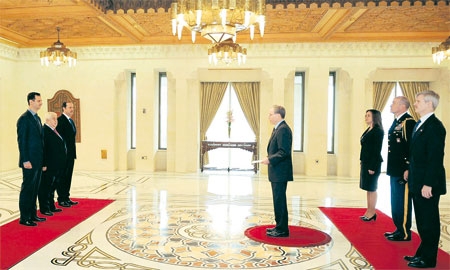The Obama administration has given clear indications that it is willing to renew ties with a country whose role is seen as crucial to peace in the region.
A notable recent development is the appointment by President Obama of a U.S. envoy to Syria. Ambassador Robert Ford presented his credentials to President Bashar al-Assad in January.
The veteran diplomat’s arrival in Damascus marks a significant shift away from the policy of diplomatic isolation of Syria pursued by former President George W. Bush. Mr. Ford’s predecessor was recalled by the Bush administration in 2005 after the assassination of Lebanon’s former Prime Minister Rafiq Hariri. Syria has always denied any role in the killing.
Taking up his new post in January, Mr. Ford acknowledged that relations between the U. S. and Syria have often been challenging. But he said his appointment was proof that America was committed to resolving disputes between the two governments.
THE U.S. RECENTLY APPOINTED A NEW AMBASSADOR TO SYRIA, AFTER A NEARLY SIX-YEAR ABSENCE
|
He said his talk with President Assad had attempted to identify areas of mutual interest and ways of addressing them that serve the interests of both countries.
At present, Syria remains designated a state sponsor of terrorism by the State Department – a charge it rejects. Since 2003, it has also been subject to U.S. economic sanctions under the Syria Accountability Act, signed into law by former President Bush, which prohibits or restricts the export and re-export of most U.S. products to Syria.
Both countries see benefits in re-establishing ties. Political and security issues affecting U.S. interests in the Middle East provide motivation for Washington, while Syria’s drive to transform and grow its economy would be assisted by an end to sanctions.
Signs of a thaw started to appear a year ago with the rescinding of a U.S. government travel warning, in place since 2006, urging Americans to consider carefully the safety and security risks of travel to Syria. Welcoming the decision, Foreign Minister Walid al-Moallem said both sides would start taking practical steps to improve relations.
At around the same time, State Department counterterrorism officials and diplomats began holding meetings with their Syrian counterparts. In April, former President Jimmy Carter visited Damascus to discuss the problems in the Middle East with President Assad. The meeting concluded with both agreeing on their support for the principle of dialogue in finding solutions to the region’s problems.

0 COMMENTS